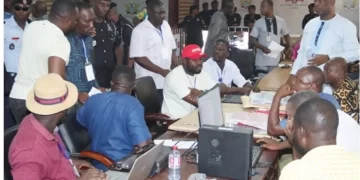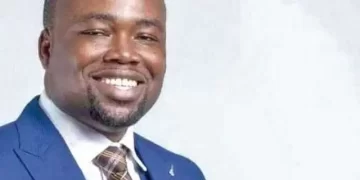 The Chief Executive Officer of the National Youth Authority (NYA), Osman Ayariga, Esq., has added his voice to the growing controversy surrounding the University of Professional Studies, Accra (UPSA)’s strict enforcement of its dress code policy. In a bold Facebook post on Wednesday, Mr. Osman Ayariga declared, “The Masses are not happy with the UPSA Authorities! Power to the students!!”
The Chief Executive Officer of the National Youth Authority (NYA), Osman Ayariga, Esq., has added his voice to the growing controversy surrounding the University of Professional Studies, Accra (UPSA)’s strict enforcement of its dress code policy. In a bold Facebook post on Wednesday, Mr. Osman Ayariga declared, “The Masses are not happy with the UPSA Authorities! Power to the students!!”
His comments come in the wake of viral videos showing a student being dragged on campus by a man alleged to be part of a task force set up to enforce the university’s “decent” dress code policy. The move, which officially took effect on July 1, 2025, bars students from entering lecture halls wearing unkempt hair, shorts, bathroom slippers, tracksuits, anklets, and nose rings, among others.
In a private comment to clarify his stance, Mr. Osman Ayariga questioned the logic behind labeling accessories like nose rings and anklets as “indecent exposure.”
“Indecent exposure? Yes! But how can a nose ring and anklet be considered indecent exposure in a university?” he queried.
He explained that indecent exposure traditionally refers to the public display of genitals or private body parts in a manner deemed offensive or alarming — a definition that, in his view, does not extend to fashion accessories or cultural expressions.
The UPSA administration, in a memo dated June 30, 2025, said the enforcement was in response to a rise in what it described as “indecent dressing” on campus. The university maintained that it was upholding its values of “scholarship with professionalism” and reminded students to adhere strictly to the dress code as outlined in the 2018 Undergraduate Students Handbook.
However, the reaction from the student body has been mixed, with many accusing the university of selective enforcement and unfair treatment. Some students claim that only Level 100 students were being targeted, while those in higher levels were ignored. Others expressed frustration after being denied access to lecture halls during assessment examinations over dress code violations.
The issue has since sparked a national conversation on students’ rights, freedom of expression, and what constitutes appropriate dress in academic settings. Osman Ayariga’s comments have added a political and youth empowerment dimension to the debate, with many praising him on social media for defending students’ dignity and autonomy.
As the backlash grows, it remains to be seen whether UPSA will reconsider or revise its approach to enforcing the dress code — or whether the controversy will galvanize a broader movement for change in Ghana’s tertiary institutions.























